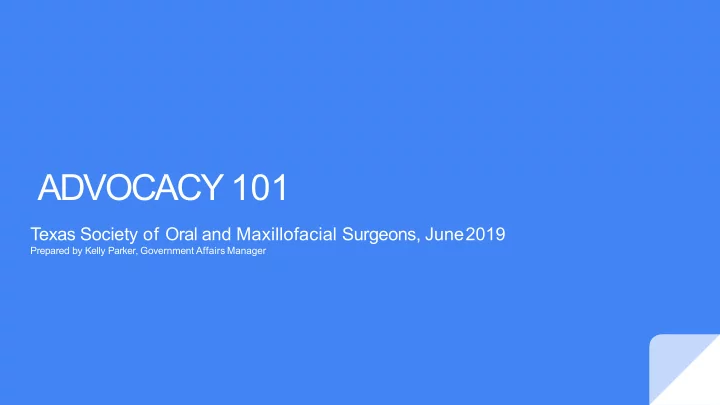

ADVOCACY 101 Texas Society of Oral and Maxillofacial Surgeons, June2019 Prepared by Kelly Parker, Government Affairs Manager
Introduction As a licensed professional, you can be affected by decisions made by state and federal legislators as well as the regulatory board. Therefore, it is in your best interest to be active in the Texas Society and be an advocate for your profession, the speciality, and issues that will directly impact your scope of practice.
TOMSPAC Get involved in TOMSPAC! TOMSPAC is the Political Action Committee (PAC) of Texas Society of Oral and Maxillofacial Surgeons. You pay an advocacy fee with your membership and renewals , but you must designate the funds to the PAC. The PAC represents oral and maxillofacial surgeons at the Capitol and makes donations to key state officials.
Advocacy 101 Making a difference as an advocate, requires time and energy on your part. This may mean taking time out of your day for calls, making a trip to Austin to attend a hearing and testify as a witness, attending TSOMS regional meetings on legislative issues or participating in the AAOMS Day On The Hill in Washington, D.C.
Advocacy 101 - Know the Issue When advocating for an issue, make sure you truly understand the issue and can articulate your position. You should consider the following: ● What change is beingproposed? ● Why is it being proposednow? ● How will it affect you, the specialty, or patients? ● Who is sponsoring, supporting, or opposing the issue? ● Where is itin the decision-making process? ● What is a suggested alternative?
Advocacy 101 - Ways to advocate Here are a few more ways you can engage in advocacy to support the profession: ● Meetings ● Letters/Emails ● Phone Calls ● State Board Meetings
Advocacy 101 -Meetings Legislators value personal meetings and discussions withOMS professionals who are constituents. OMS constituents can provide valuable information on issues. Remember, legislative staff members are just as important as the legislator, so if you get a meeting with a staff member instead - build that relationship! To find out who represents you, go to: https://wrm.capitol.texas.gov/home
Advocacy 101 -Letters/E-mails While in-person meetings are most effective, letters/emails from OMS constituents are also encouraged. You should outline key points and the reasons why the issue makes a difference. Always remember to identify yourself as a resident in the legislator’s district and maintain a professional voice.
Advocacy 101 - Phone Calls Once you have an established relationship with your legislator, consider calling them about important issues. Always identify yourself as a constituent and an OMS. Be sure to leave a clear butbrief message.
Advocacy 101 -Visits/Fundraisers During off-season (non-legislative session), you may consider inviting your legislator to visit your office to get a better understanding of your practice and the specialty. You may also consider hosting a fundraiser for your legislator at your home or office.
Texas State Board of Dental Examiners (TSBDE) The Legislature creates laws and grants the TSBDE rulemaking authority, soit is also important to get involved at the state dental board level. You can do this by attending board meetings, committee meetings, stakeholder meetings, and forming personal relationships withboard members. If the TSBDE is considering new rules or rule changes, you can advocate for the specialty by making public comments at a meeting or submitting written comments to boardstaff. For more information visit: www.tsbde.texas.state.gov
Reasons to Advocate forOMS There are many important reasons for becoming a voice and advocate forthe specialty: 1. Your extensive training, particularly in anesthesia/sedation, provides you with unique expertise and a surgical perspective that may be unavailable from other general dentists and dental specialties. 2. Laws/rules are always changing. As an advocate you can influence their content through your expert opinion. 3. If you don’t, then who will? Your involvement and advocacy will determine what you and the specialty can do in the future.
Questions? Government Affairs Contacts: Dr. Brian Stone, TOMSPAC Chair Bruce Scott, Lobbyist Kelly Parker, Government Affairs Manager Colby Tiner, Campaign Treasurer
Recommend
More recommend